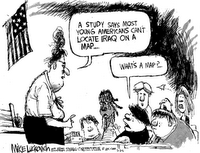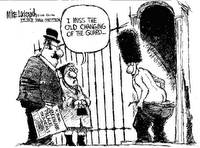This blog is in memory of my late mother
Jyoti G. Kulkarni (nee Shakuntala V. Bhate) and my aunt
Tai mavashi (the late Malati J Deval of Kolhapur)- reminiscent of
G A Kulkarni's (जी ए कुलकर्णी) "
Tani Mavashi".
They always conquered their pain with a big heart and a bigger laugh. Not a moment was dull when they were around.
At the end of it all, one is looking for a reason to laugh. Society which has become smug and arrogant finds it hard to laugh at others and, hopefully and more importantly, at self.
Laugh is like a sneeze or a yawn. Shadowing us all the time but occasionally- like a shadow- hard to find. And hence the search!
But this is not about laugh alone.
As poet
B S Mardhekar (बा.सी.मर्ढेकर) says here:
पंक्चरली जरि रात्र दिव्यांनीं,
तरी पंपतो कुणी काळोख;
हसण्याचें जरि वेड लागलें,
भुंकतात तरि अश्रू चोख.
"Punctured though night is by lightbulbs,
Someone is pumping darkness;
Though laughter crazed,
tears bark alright."
Inspiration for this came from the late
D G Godse (द ग गोडसे), arguably the best visual art critic in the country, who has penned many brilliant commentaries on subjects from paintings in
Ajanta to
Shaniwar-wada, architecture of
Raigad to Mandu and so on.
Shri.
M V Dhond (म वा धोंड) taught me the value of versatility in an art critic and importance of following your own instincts.
Vasant Sarwate (वसंत सरवटे) showed when I was in school that art of cartooning is no less than music, painting or poetry. Sarwate is a worthy successor to great humourists
Shripad Krishna Kolhatkar (श्रीपाद कृष्ण कोल्हटकर), C V Joshi (चिं वि जोशी) and also Natyachhatakar Diwakar (नाट्यछटाकार दिवाकर). Vilas Sarang (विलास सारंग), the most under-rated writer/critic in Marathi ever, told: “…..seriousness does not mean solemnity….. Just learn from the poetry of Sadanand Rege (सदानंद रेगे) and Arun Kolatkar (अरुण कोलटकर)”. I am trying.
And my father Gopal Dutt Kulkarni (गोपाळ दत्त कुलकर्णी ) who has been critic of all life and art around him since I heard him first time.
But why bother and express oneself?
Vivekananda: “Let us remember that the civilization of the West has been drawn from the fountain of the Greeks, and that the great idea of Greek civilization is that of expression. In India we think – but unfortunately sometimes we think so deeply that there is no power left for expression. Gradually, therefore, it came to pass that our force of expression did not manifest itself before the world; and what is the result of that? The result is this – we work to hide everything we had. It began first with individuals as a faculty of hiding, and it ended by becoming a national habit of hiding-there is a such a lack of power of expression with us that we are now considered a dead nation. Without expression how can we live? The backbone of Western civilization is expansion and expression”
What is it worth? You decide but let Mardhekar again express himself.
भरून येइल ह्रुदय जेधवां
शरीर पिळुनी निघेल घाम;
अन् शब्दांच्या तोंडांमध्यें
बसेल तूझा गच्च लगाम;
काळयावरतीं जरा पांढ़रें
ह्या पाप्याच्या हातुन व्हावें
फक्त तेधवां : आणि एरव्हीं
हेंच पांढऱ्या वरतीं काळे!
But why blog and not a book perhaps?

Courtesy:Artist: Paul Wood, The Spectator, 2007
"I thought I had a book inside me but it was just a blog."






